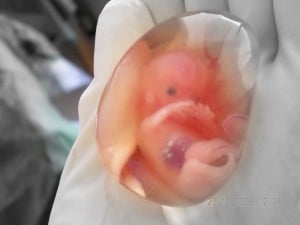It would be laughable, were it not so tragic.
On October 5, 2010, President Obama signed into law S. 2781, “Rosa’s Law.” Introduced by Sen. Barbara Mikulski in 2009, Rosa’s Law changes references in many Federal statutes that currently refer to “mental retardation” to refer, instead, to “intellectual disability.”
This is well and good. We will no longer use a term which has become demeaning to certain individuals who, through no fault of their own, have impaired learning skills. The Federal government’s terminology will be aligned with that of the American Psychiatric Association and the health division of the United Nations.
The problem, though, is that many—in fact, a majority—of the individuals whose feelings are “protected” never have the opportunity to worry about what others might call them. That’s because with the expanded use of prenatal screening, pregnant women can know whether the child they carry has a disability, such as Trisomy 21 (Down syndrome). And sadly, when informed that the child she carries will be born with Down syndrome (and at the urging of her physician), 92% of mothers choose to abort.
Perhaps it is fear that drives this staggering statistic: fear that they lack the strength and knowledge to accept and raise a special needs child, fear that society will be unkind. Or perhaps it’s selfishness, bred in a society that expects, even demands, that life’s journey will be an easy ride.
* * * * *
My husband and I have been blessed with three talented and healthy children. I do, though, have two very poignant memories of Down syndrome children.
When my own children were young, I taught a Saturday morning catechism class. Just down the hall were the “special needs” students; and I remember that one morning in particular, one of them was not feeling well. The sick student lay on a couch in the program director’s office, waiting for her parents to come. And around her, unbidden but unwilling to leave their sick friend, the entire class stood in silent sympathy—stroking her cheek and her hair, kissing her fingers, offering a blanket or a drink of water. And loving her. Loving, because that’s what they do best.
Years later, I got to know a young woman with Trisomy 21 who, with her parents, attended daily Mass at the Catholic ministry where I worked. She couldn’t remember all the complicated responses during the Mass, but she added her exuberant “Amen” to ours. And she always recognized one longer prayer, and popped in one of her own. When the community prayed “Lord, we give you thanks and praise…” she belted out her own simple but heartfelt prayer, “THANKS AND PRAISE!!”
I’m sure that God, looking down from His Throne, smiled at her sincere and simple expression of love. I can only hope that my miserable, distracted attempt at worship was accepted as well—especially since I was in such good and holy company.
* * * * *
Sarah Palin, on the campaign trail, described how she felt when she learned, after 12 weeks of pregnancy, that the child she was carrying had Down syndrome. “I said, ‘God, I don’t think I can handle this. This wasn’t part of my life’s plan.’”
But Palin went on to tell of her decision to continue the pregnancy and keep the child. She described her now-two-year-old son Trig as her family’s “greatest blessing,” and said he was “God whispering in my ear, saying, ‘Are you going to trust me? Are you going to walk the walk or are you going to talk the talk?’ ”
* * * * *
There is criticism among physicians and ethicists for a policy which encourages abortion of Down syndrome fetuses. Commentator George Will called it “eugenics by abortion.” Dr. David Mortimer, in Ethics & Medicine, wrote that “Down syndrome infants have long been disparaged by some doctors and government bean counters.” Even the controversial bioethicist Dr. Peter Singer of Princeton argued that Down syndrome “is not so crippling as to make life not worth living from the inner perspective of the person with the condition.” (Of course Singer, to his detriment, believes that children are not “persons” until they are two years of age, and that their parents should be permitted to kill them until that time.)
The Catechism of the Catholic Church (2276) notes that “Those whose lives are diminished or weakened deserve special respect. Sick or handicapped persons should be helped to lead lives as normal as possible.”
LORD, PLEASE GIVE OUR SOCIETY the strength and the grace to see that the lives of these most vulnerable of your people are important. Help us to model the virtues which come so naturally to them: a hopeful spirit, a cheerful heart, and an unquestioning faith, and above all, a deep and abiding love. Amen.















